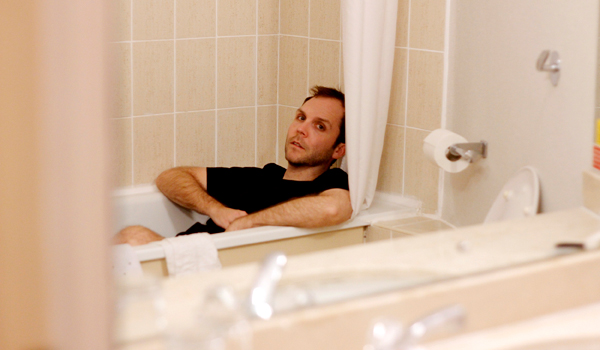Photo credit: Rachel Mars
Greg Wohead is a writer, performer and live artist originally from Texas. He makes theatre performances, one-to-one pieces and audio works. He also writes great articles for Run-Riot. Here he writes about that classic track, Stand by Me – and, ultimately, the joy of human connection.
Over 400 different cover versions of the song Stand By Me have been recorded since it was originally written by Ben E. King, Jerry Leiber and Mike Stoller in 1960. In my show, Celebration, Florida, you can hear 8 of them (plus the original version slowed down by 800 percent). Celebration, Florida is a theatre performance that deals with stand ins, surrogates, cover versions. Things that are once, twice, three times (or more) removed; people and places that are at a distance, the longing involved when we miss people and the realisation that the person we’re missing (or the version of them we imagine) might never have existed in the first place.
When Stand By Me was first released in 1961, the writing was credited to King— who originally performed the song — and ‘Elmo Glick’, a pseudonym for Leiber and Stoller. In an interview for The Guardian several years ago, Stoller recalled the writing process for Stand By Me, saying that Ben E. King came into the studio with a song he had written for the Drifters (the band he was originally a part of) that was inspired by Lord, Stand By Me, an old gospel song.
Stoller said that he heard King sing the new song a capella. Then he walked over to the piano and came up with what is now that legendary bass line that opens the song and continues throughout: bum bum bummm bummm, bum bum bummm bummm, etc. Apparently Jerry Leiber heard it and shouted, “That’s it – that’s a hit!”
I love the idea of that. Like it’s from a film. You can imagine the scene: Ben E. King stands in the studio singing a slow, almost rhythmless version of the song, familiar to us as viewers from the future, but to him it’s slightly hesitant, fresh. His voice sounds sharp, but full. The lyrics are strong and clear. But it’s missing something.
Stoller and Leiber listen, and when King finishes singing they look at each other. What does it need? Drums? A guitar riff? No. Stoller looks at the piano. The room is still silent as he slowly, deliberately walks over to it. He doesn’t bother sitting down—he’s a busy man at work after all—he stands in front of the piano, hunching over it in concentration. Stoller plays those familiar notes, only at first it’s all out of rhythm: bummmm bummmm bummmm bummmm. He pauses. Tries again: bummmm bummmm bum bum. No. He looks up at King and smiles. Once more. Stoller launches perfectly and confidently into the iconic bass line we all know, and King smiles. Leiber slowly stands as the camera zooms in on him. He shouts: “That’s it – that’s a hit!”
It’s just the story you want behind an iconic, familiar, beloved song like Stand By Me, and in many ways it doesn’t matter whether it’s true or not—it only exists in the unreliable memories of the people who were there, so for anyone who hears the story, whether it actually happened that way doesn’t make any difference.
These kinds of stories exist for each of us in our own lives, I think: idealised movie-like versions of things that have happened to us, places we have been, people we have known. Sometimes we play up these memories, punch up the dialogue, heighten the drama. We make it make sense so that it adds up to what we know happened after. We know that Stand By Me became a huge hit, so it’s perfect for the story for Leiber to call the song a hit—we know it will be. In a similar way we look for clues in our past that make the present inevitable (“Of COURSE she became a mathematician, she always liked counting when she was a kid” or “I always knew he would be a famous chef, you know he once asked me for a cake recipe as a teenager.”).
But what happens when we allow ourselves to question the reliability, the inevitability of the stories that make up our personal lives, our social relationships or our cultures? In Celebration, Florida I try to use subtle ways of playing with the form of the performance to throw inevitabilities into question—two unrehearsed performers who have never met before stand in for me and perform the show guided by instructions via headphones. Sometimes you don’t quite know what is a direct instruction or what is coming from the performers. There are allusions to a town in Florida that seems too strange to be real, but is it?
Hopefully as an audience member you’re being guided towards images, sounds and feelings that seem familiar, but removed. But for me the heart of the piece is witnessing the experience of the two performers. The entire time you’re seeing two performers who didn’t know each other begin to spend time together, to get to know each other in some sort of way and depend on each other to get through the show. Maybe in amongst the confusion of conflicting stories and trying to parse out what’s ‘real’ and what’s not, we can just enjoy human connection. Two people asking one another to stand by them.
Celebration, Florida
at Soho Theatre
19-23 June
Tickets and info: sohotheatre.com
